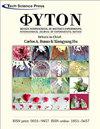Widely Untargeted Metabolome Profiling Provides Insight into Browning and Nutritional Quality Changes in Short-Term Stored Fresh-Cut Potato (Solanum tuberosum L.) Shreds
IF 1.3
4区 生物学
Q3 PLANT SCIENCES
Phyton-international Journal of Experimental Botany
Pub Date : 2023-01-01
DOI:10.32604/phyton.2023.030928
引用次数: 0
Abstract
Potato (Solanum tuberosum L.) is susceptible to enzymatic browning after fresh processing, resulting in color change and potential alteration in the nutritional quality. In this study, a popular potato cultivar, Feiwuruita, was used to profile the metabolites involved in color and nutritional quality changes in fresh shreds stored at 0 and 4 h at 25°C (designated CK and CK4H, respectively). The shreds turned brown within 4 h of storage. In all, 723 metabolites consisting 12 classes of compounds were detected in the samples, largely lipids, phenolic acids, alkaloids, amino acids and derivatives, flavonoids, organic acids, nucleotides and derivatives. Of these, 163 metabolites accumulated differentially between CK and CK4H shreds. Polyphenolic compounds (phenolic acids and flavonoids) mostly increased in the shreds after 4 h storage. Conversely, the short-term storage drastically reduced lipid compounds (25 LysoPC and 19 LysoPE), while essential alkaloids and terpenoid compounds that are beneficial to human health increased in accumulation. The findings present global metabolome and nutritional composition changes in short-term stored shreds of Feiwuruita. This study provides important foundation for future studies on browning prevention/reduction and for better utilization of Feiwuruita.广泛的非靶向代谢组分析提供了短期储存鲜切马铃薯(Solanum tuberosum L.)褐变和营养品质变化的见解碎片
马铃薯(Solanum tuberosum L.)在新鲜加工后易受酶促褐变的影响,导致颜色变化和营养品质的潜在改变。本研究以马铃薯热门品种Feiwuruita为研究对象,分析了25°C(分别为CK和CK4H)保鲜0和4 h后马铃薯鲜丝颜色和营养品质变化的代谢物。碎片在储存的4小时内变成棕色。在样品中共检测到12类化合物的723种代谢物,主要是脂质、酚酸、生物碱、氨基酸及其衍生物、类黄酮、有机酸、核苷酸及其衍生物。其中,有163种代谢物在CK和CK4H片段间积累差异。多酚类化合物(酚酸类和黄酮类)在贮藏4 h后增加较多。相反,短期储存会大幅减少脂质化合物(25 LysoPC和19 LysoPE),而对人体健康有益的必需生物碱和萜类化合物则会增加积累。研究结果表明,短期储存的飞乌鲁特碎肉中代谢组和营养成分发生了变化。该研究为进一步研究飞毛菇预防/减少褐变和更好地利用飞毛菇提供了重要的基础。
本文章由计算机程序翻译,如有差异,请以英文原文为准。
求助全文
约1分钟内获得全文
求助全文
来源期刊
CiteScore
1.90
自引率
11.80%
发文量
17
审稿时长
12 months
期刊介绍:
Phyton-International Journal of Experimental Botany is an international journal that publishes on the broadest aspects of plant biology and ecology. The journal welcomes the original and exciting submissions that provide new and fundamental insights into the origins, development, and function of plants from the molecular to the whole organism and its interactions within the biotic and abiotic environment. Phyton-International Journal of Experimental Botany publishes outstanding research in the plant and ecology sciences, especially in the areas of plant physiology and biochemistry, plant metabolism, plant ecology and evolution, as well as those making use of synthetic, modeling, bioinformatics, and -omics tools. Manuscripts submitted to this journal must not be under simultaneous consideration or have been published elsewhere, either in part or in whole.

 求助内容:
求助内容: 应助结果提醒方式:
应助结果提醒方式:


